
Access
Research
Network
|
|
Access |
ARN-Announce is the on-line announcement and information service of Access Research Network. ARN generates announcements to the current ARN Announce list as information becomes available. You have received this message because your email address was submitted to this list. Subscription and Unsubscription information is at the end of this message.
Click here for a text-only version of this document.
IN THIS ARN-ANNOUNCE:
It is customary this time of year to pause and reflect on the significant Intelligent Design events of the past 12 months. But rather than summarize them here, I’d like to direct you to our new ID Update Blog where you can read capsule summaries and follow the links to full-length stories located around the internet.
You can start with Mark Hartwig’s editorials about the Darwinian double standard that was revealed when a prominent ID author had a paper published in a peer-reviewed biology journal, or reflect on National Geographic’s feeble attempt to declare that all is well with Darwinian Evolution in their November 2004 issue, or consider the myth of the biotech revolution that is based on reductionist Darwinian thinking, or review the various efforts being made around the country to “Teach the Controversy” in Georgia, Pennsylvania, Wisconsin, and on National Public Radio, or ponder how scientists continue to reverse-engineer the remarkable designs found in nature such as the Water Strider, or marvel at how information is becoming the new language of science, and yet no one can explain where information comes from. Tom Magnuson, our busy volunteer news editor has been posting all of this information since our Blog went live in October. You can also find fascinating news for this year and prior years in our news archives. You may also want to drop in on our ID Discussion Forum to observe proponents and critics of ID engage in spirited dialog on these and other events and issues of the past year, or visit the What’s New section of our IDURC student website.
I challenge you to stop and browse through the news stories, editorials, and discussion forum then draw your own conclusions about the State of the ID Union. If you happen to run across some interesting news stories or scientific articles relevant to ID this coming year that others might benefit from, please pass them along to Tom Magnuson (tmagnuson@arn.org) so he can post them to the ID Update Blog. That’s what it means to be part of the volunteer network at Access Research Network.
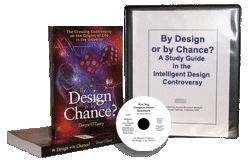 One of ARN’s significant contributions to the ID community this year, is a new study guide that was designed to help any high school, college or adult student get up to speed quickly on the Darwin v. Design controversy. You might consider this our training manual for ID Boot Camp, which we are releasing this month. The study guide is designed to help you navigate through the important issues in a 10 week overview course or guide you systematically through 22 key books and 18 of the best video resources available on the topic.
One of ARN’s significant contributions to the ID community this year, is a new study guide that was designed to help any high school, college or adult student get up to speed quickly on the Darwin v. Design controversy. You might consider this our training manual for ID Boot Camp, which we are releasing this month. The study guide is designed to help you navigate through the important issues in a 10 week overview course or guide you systematically through 22 key books and 18 of the best video resources available on the topic.
Before I tell you any more about the study guide I’d like to share some comments from a few familiar names on this important resource:
I recommend By Design or by Chance? with its superb study guide for homeschooling parents, teachers, and anyone who wants to get up to speed in understanding the most important and challenging question to face our culture, the question of creation and intelligent design.
– Phillip E. Johnson, author of Darwin on Trial
Darwinists fear critical thinking, because their theory is based on distorted and exaggerated evidence that cannot stand up to it. This new study guide, written to accompany Denyse O’Leary’s book By Design or by Chance? encourages the kind of critical thinking that will spell the end of Darwinism and prepare students for the coming revolution in biological science.
– Jonathan Wells, author of Icons of Evolution
With all the resources currently available on intelligent design, where does one start? The By Design or By Chance? Study Guide is an excellent tool for mastering that material. Students who work their way through the ten lessons and recommended resources will have a good grounding in both evolution and intelligent design and will be prepared to think critically about this important topic."
-- William Dembski, author of The Design Revolution
By Design or by Chance? Study Guide is a lively 10-lesson study course on the growing intelligent design controversy that introduces students to a wide range of scientific topics such as biology and cosmology in the context of history and current events. The course was developed by Access Research Network (ARN) and author Denyse O’Leary, and is based on her recent book By Design or by Chance? (Augsburg Fortress, 2004), which has been widely praised for its clarity, even-handedness, high interest level, and use of teaching elements. As both a journalist and a textbook editor, O’Leary offers a unique background that is well suited for a course of study in intelligent design.The course includes self-test instruments for each chapter and an end-of-course project that requires the student to address the current intelligent design controversy. The student will prepare a written, oral, broadcast, or art/performance project that demonstrates awareness of the issues and offers a personal response.The course is aimed at the high school student achievement level, with an interest in science, civics, and current events. It may be especially helpful for students who struggle with science concepts, because it helps them perceive how these concepts are relevant to society. The course is designed for self-study, homeschool, and private or public school classroom use.The course is available in three editions: Standard, Deluxe, and Advanced.
The Standard Edition includes a copy of the book By Design or by Chance? and the study guide. Reading assignments from the book are presented at the beginning of each lesson. It is not necessary to purchase any additional resources to complete the Standard 10-lesson course. However, many of the optional challenges refer to recommended books and videos that will allow the student to delve deeper into the topic or to reinforce points made in the lesson. Some of these resources can be found at your local library or bookstore, and all of them are available for purchase from ARN (www.arn.org). The ARN catalog number (ARN Cat#) is provided for each recommended resource and you can find a further description of each item online. The Standard Edition bundle offers a 15% savings over the individual prices of the By Design or By Chance? book and study guide.
The Deluxe Edition is designed for those who want to enhance the learning experience with four of our most popular documentary videos, along with four introductory books and two study guides. The videos included are: Icons of Evolution (V025SKS), Unlocking the Mystery of Life (V026), The Privileged Planet (V039), and Voyage Inside the Cell (V036). The books in the Deluxe Edition include: By Design or By Chance? (B088SK), Defeating Darwinism by Opening Minds (B023), What’s Darwin Got to Do With It (B032), and The Design Revolution (B079). The Deluxe Edition bundle offers a 25% savings over the individual prices of the included items.
The Advanced Edition is designed for those who want to expand the 10-lesson course into a semester or year-long curriculum, or those who want to delve deeper into the scientific details of the controversy. In addition to the four documentary videos included in the Deluxe Edition, the Advance Edition contains 14 exclusive ARN debate, lecture and interview videos that allow students to hear first-hand from the scientists and educators that are in the forefront of the intelligent design controversy, as well as several notable ID critics. The Advanced Edition is available with i) the additional videos only, or ii) combined with 22 of the books referenced in the Study Guide for further investigative study. Those who are able to master a majority of the books and videos in the full Advanced Edition will have a firm grasp on the intelligent design controversy, the arguments of the leading figures in the debate, and the important texts upon which the debate is centered. The bundled price of the Advanced Edition provides a 30% discount over the individual prices of the items and allows individuals, homeschool co-ops and schools to purchase a significant set of resources at a substantial discount.
Study Guide Table of Contents
Getting Started
Lesson 1. Introduction: Why Is There a Controversy?
Lesson 2. Was Our Universe Designed? Arguments For and Against
Lesson 3. Can Life Arise by Chance? What Difference Would That Make?
Lesson 4. Did Darwin Have the Answer to the Mystery of Life?
Lesson 5. The Scopes Trial: What Really Happened?
Lesson 6. Darwin’s Heirs: What Do Darwinian Evolutionists Say Today?
Lesson 7. Modern Creationists: Who Are They? What Do They Really Say?
Lesson 8. Intelligent Design: What Is This Design Thing? Can It Be Science?
Lesson 9. Intelligent Design: Can This Be Religion? Does It Have a Future?
Lesson 10. Your Turn! A Chance to Be Heard
Glossary
Self-Test Answers
To order just the study guide (if you already own the book) or the Standard, Deluxe or Advanced edition of the Study Kit, or to see the complete list of books and videos that come with the Advanced Editions go to: http://www.arn.org/arnproducts/coverimages/b088sk.htm
As it is nearing the end of the year we would like to highlight some of the important products that have been added to the ARN catalog over the past six months, in case you missed the original announcement or you happen to be in a Christmas shopping mood. I’ll start with the new ARN products and move on to other significant books and videos.
Intelligent Design and the Future of ScienceSave 30% when you buy the entire set, or 20% for a set of 5.
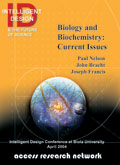 In April 2004 over 30 scientists and educators addressed a conference crowd of over 500 at Biola University on the topic of Intelligent Design and the Future of Science. If there is mounting evidence for intelligent design in nature, then how will this impact how we conduct scientific research? The list of speakers included Phillip Johnson, William Dembski, Jonathan Wells, Michael Behe, Michael Ruse, William Provine, Marcus Ross, Stephen Meyer, Jed Macosko, John Bloom, J.P. Moreland, Paul Nelson, Robin Collins, Jay Richards, Guillermo Gonzales, Walter Bradley, Hugh Ross, Fuz Rana, Nancy Pearcey, Richard Weikart, John-Mark Reynolds, Lee Strobel, John Calvert, Craig Hazen, Seth Cooper and many more.Although we were not able to capture all of the parallel session lectures on video, we gathered a majority of the significant talks on this 13 DVD set. We are also offering a 5 DVD subset for those who want to view some of the highlights in a smaller dose. All of the DVDs can be ordered individually if there is a particular topic that is of interest.So whether you order one, five (save 20%) or all thirteen DVDs (save 30%), I think you will be impressed with the presentations and update on the latest developments in the ID movement.
In April 2004 over 30 scientists and educators addressed a conference crowd of over 500 at Biola University on the topic of Intelligent Design and the Future of Science. If there is mounting evidence for intelligent design in nature, then how will this impact how we conduct scientific research? The list of speakers included Phillip Johnson, William Dembski, Jonathan Wells, Michael Behe, Michael Ruse, William Provine, Marcus Ross, Stephen Meyer, Jed Macosko, John Bloom, J.P. Moreland, Paul Nelson, Robin Collins, Jay Richards, Guillermo Gonzales, Walter Bradley, Hugh Ross, Fuz Rana, Nancy Pearcey, Richard Weikart, John-Mark Reynolds, Lee Strobel, John Calvert, Craig Hazen, Seth Cooper and many more.Although we were not able to capture all of the parallel session lectures on video, we gathered a majority of the significant talks on this 13 DVD set. We are also offering a 5 DVD subset for those who want to view some of the highlights in a smaller dose. All of the DVDs can be ordered individually if there is a particular topic that is of interest.So whether you order one, five (save 20%) or all thirteen DVDs (save 30%), I think you will be impressed with the presentations and update on the latest developments in the ID movement.
To order any or all of the Biola Conference DVD lectures go to: http://www.arn.org/arnproducts/coverimages/v053.htm
 Although the challenge to Darwinism is not as fierce in Europe as it is in the U.S., there are a growing number of scientists who are speaking out against naturalism and in favor of design, as evidenced by the 8th European Creationist Congress held August 15-20, 2003 in Sweden. This CD set brings you some of the best presentations and top speakers from that event. Although Dr. Paul Nelson cannot be counted among the European scientists, we are pleased to be able to include his talk at that event as his first video lecture available from ARN.This exciting new format has been created with Microsoft Producer 2 and Windows Media 9, which allows us to provide video lecture material at a lower cost than the standard DVD format. These CDs can be viewed on a PC running Windows 98, ME, 2000 or XP. The video lecture plays in a small window in the upper corner of your screen, while the Power Point slide the speaker is lecturing from, displays with great resolution at the center of your screen. The viewer can select and jump to any slide in the presentation of the lecture.The 11 CD set includes 1) Dr. André Eggen: Whole Genome Sequencing: Implications for Creation Research; 2) Dr. David Rosevear: The Origins of Life and Göran Schmidt: Teaching the Origin Issue in Schools; 3) Dr. Paul Nelson: On Common Descent and Dr. Paul Nelson: The Concept of Intelligent Design; 4) Dr. Stuart Burgess: The Beauty of Man; 5) Dr. Werner Gitt: The Origin of Information; 6) Dr. Harald Binder: Is a RNA-world Plausible? 7) Prof. Matti Leisola: Origin of Protein Families; 8) Dr. Lee Spetner: Random Mutations Cannot Explain How Life Arose; 9) Dr. Erik Persson: Strong Delusion: Some Reflections On Scientific Naturalism; 10) Krister Renard: The Unreasonable Effectiveness of Mathematics in the Natural Sciences; and 11) Dr. Harald Binder: Amber - New Insights.
Although the challenge to Darwinism is not as fierce in Europe as it is in the U.S., there are a growing number of scientists who are speaking out against naturalism and in favor of design, as evidenced by the 8th European Creationist Congress held August 15-20, 2003 in Sweden. This CD set brings you some of the best presentations and top speakers from that event. Although Dr. Paul Nelson cannot be counted among the European scientists, we are pleased to be able to include his talk at that event as his first video lecture available from ARN.This exciting new format has been created with Microsoft Producer 2 and Windows Media 9, which allows us to provide video lecture material at a lower cost than the standard DVD format. These CDs can be viewed on a PC running Windows 98, ME, 2000 or XP. The video lecture plays in a small window in the upper corner of your screen, while the Power Point slide the speaker is lecturing from, displays with great resolution at the center of your screen. The viewer can select and jump to any slide in the presentation of the lecture.The 11 CD set includes 1) Dr. André Eggen: Whole Genome Sequencing: Implications for Creation Research; 2) Dr. David Rosevear: The Origins of Life and Göran Schmidt: Teaching the Origin Issue in Schools; 3) Dr. Paul Nelson: On Common Descent and Dr. Paul Nelson: The Concept of Intelligent Design; 4) Dr. Stuart Burgess: The Beauty of Man; 5) Dr. Werner Gitt: The Origin of Information; 6) Dr. Harald Binder: Is a RNA-world Plausible? 7) Prof. Matti Leisola: Origin of Protein Families; 8) Dr. Lee Spetner: Random Mutations Cannot Explain How Life Arose; 9) Dr. Erik Persson: Strong Delusion: Some Reflections On Scientific Naturalism; 10) Krister Renard: The Unreasonable Effectiveness of Mathematics in the Natural Sciences; and 11) Dr. Harald Binder: Amber - New Insights.
To order the 11 CD set and save 45% over the individual title prices, go to http://www.arn.org/arnproducts/cd/cd001.htm
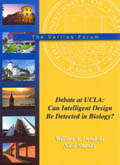 American’s love a good fight, especially when refereed at one of our institutions of higher learning. If you enjoyed our popular Stanford debate between William Provine and Phillip Johnson, then you will love this three round match between heavy weights Dr. William Dembski (author of The Design Revolution) and Dr. Niall Shanks (author of God, the Devil, and Darwin: A Critique of Intelligent Design Theory) held recently at UCLA. The topic for this debate is “Can Intelligent Design be Detected in Biology?”
American’s love a good fight, especially when refereed at one of our institutions of higher learning. If you enjoyed our popular Stanford debate between William Provine and Phillip Johnson, then you will love this three round match between heavy weights Dr. William Dembski (author of The Design Revolution) and Dr. Niall Shanks (author of God, the Devil, and Darwin: A Critique of Intelligent Design Theory) held recently at UCLA. The topic for this debate is “Can Intelligent Design be Detected in Biology?”
Dembski and Shanks debate whether the complexities of nature require an intelligent designer. Dembski says that there is evidence that such a designer did play a role. Shanks argues that there is no scientific evidence for the claim and the fact that scientists cannot answer certain questions should not, by default, make the case for proponents. Could intelligent design in biological systems be scientifically detectable, and has it in fact been detected in nature? Intelligent design holds that intelligence is responsible for many of the instances of the order and complexity in the natural world. The idea that intelligence underlies physical reality has a long and illustrious history. Throughout that history, intelligent design has seemed eminently reasonable. Only with the rise of Darwinian evolution, however, has this idea come to seem unreasonable. Is Darwinism now experiencing a crisis that is making its challenge to intelligent design increasingly unreasonable?
To order your copy of the Debate at UCLA: Can Intelligent Design Be Detected in Biology video DVD go to http://www.arn.org/arnproducts/php/video_show_item.php?id=28
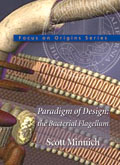 The bacterial flagellum is a complex macromolecular machine. Are the forces of mutation and natural selection sufficient to build these structures? Do type III secretory organelles truly reflect intermediate structures? Dr. Minnich presents a review of our current understanding of these systems in this well-illustrated lecture.This is an update of an earlier lecture video we carried by Dr. Minnich, which was presented at Westmont College (V021). Much of the same material is covered in this video, which is a better recording and includes a good Q&A session. If you own the first video, you probably don’t need to buy this one. But if you have never studied the detailed construction of the bacteria flagellum, and you’d rather not wade through the technical literature on your own, then this is another “must buy” video for your ID collection.
The bacterial flagellum is a complex macromolecular machine. Are the forces of mutation and natural selection sufficient to build these structures? Do type III secretory organelles truly reflect intermediate structures? Dr. Minnich presents a review of our current understanding of these systems in this well-illustrated lecture.This is an update of an earlier lecture video we carried by Dr. Minnich, which was presented at Westmont College (V021). Much of the same material is covered in this video, which is a better recording and includes a good Q&A session. If you own the first video, you probably don’t need to buy this one. But if you have never studied the detailed construction of the bacteria flagellum, and you’d rather not wade through the technical literature on your own, then this is another “must buy” video for your ID collection.
To order your copy of The Paradigm of Design: The Bacterial Flagellum go to: http://www.arn.org/arnproducts/php/video_show_item.php?id=23
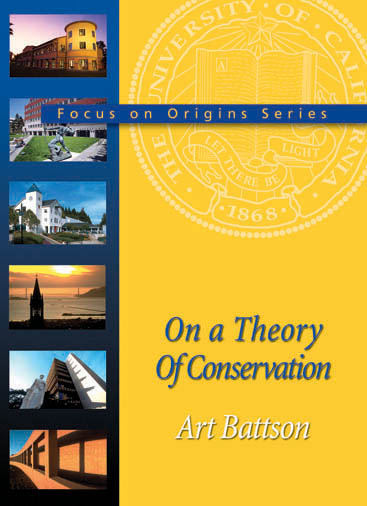 Darwin's greatest insight was perhaps his admission in the Origin of Species that one could come to "directly opposite conclusions."Modern neo-Darwinian theory is based upon the fundamental assumption of philosophical materialism that all genetic information and the arrival of the fittest arose purely by chance and that the environment, which also must have developed purely by chance, accounts for the survival of the fittest.After describing the conflicts between Darwinian predictions and the pervasive patterns of natural history, Art Battson proposes the development of a Theory of Conservation to explain biology's "ordinary rules of stability" including genetic, ecological, and developmental factors which inhibit major evolutionary change from occurring. The ultimate purpose of a Theory of Conservation is to more accurately describe biological processes than neo-Darwinian theory is capable of doing.
Darwin's greatest insight was perhaps his admission in the Origin of Species that one could come to "directly opposite conclusions."Modern neo-Darwinian theory is based upon the fundamental assumption of philosophical materialism that all genetic information and the arrival of the fittest arose purely by chance and that the environment, which also must have developed purely by chance, accounts for the survival of the fittest.After describing the conflicts between Darwinian predictions and the pervasive patterns of natural history, Art Battson proposes the development of a Theory of Conservation to explain biology's "ordinary rules of stability" including genetic, ecological, and developmental factors which inhibit major evolutionary change from occurring. The ultimate purpose of a Theory of Conservation is to more accurately describe biological processes than neo-Darwinian theory is capable of doing.
To order On a Theory of Conservation go to: http://www.arn.org/arnproducts/php/video_show_item.php?id=24
 Is Darwinian evolution simply a scientific theory, or is it a worldview that attempts to explain and direct all of reality? Nancy Pearcey argues the latter in this lecture presented at the University of California, Santa Barbara. Pearcey documents the broader cultural implications of Darwinism with a survey of recent books that give a Darwinian perspective on politics, education, history, health, sexuality, literature, morality, religion, and law.But the most telling evidence of the cultural impact of Darwinism for Pearcey was a Berenstain Bear’s children’s book she purchased several years ago for her son. In Nature Guide, the Berenstain Bear’s indoctrinate young minds in the Darwinian world view with classic Carl Saganisms such as “Nature is all that is, or was, or every will be.”Pearcey finishes with a preview of her new book, Total Truth, explaining how the cultural spread of Darwinism is a direct result of the Fact/Value dichotomy of modernism that segregates values and religion to the upper story of private beliefs from the lower story public world of rationalism and facts.
Is Darwinian evolution simply a scientific theory, or is it a worldview that attempts to explain and direct all of reality? Nancy Pearcey argues the latter in this lecture presented at the University of California, Santa Barbara. Pearcey documents the broader cultural implications of Darwinism with a survey of recent books that give a Darwinian perspective on politics, education, history, health, sexuality, literature, morality, religion, and law.But the most telling evidence of the cultural impact of Darwinism for Pearcey was a Berenstain Bear’s children’s book she purchased several years ago for her son. In Nature Guide, the Berenstain Bear’s indoctrinate young minds in the Darwinian world view with classic Carl Saganisms such as “Nature is all that is, or was, or every will be.”Pearcey finishes with a preview of her new book, Total Truth, explaining how the cultural spread of Darwinism is a direct result of the Fact/Value dichotomy of modernism that segregates values and religion to the upper story of private beliefs from the lower story public world of rationalism and facts.
To order the Darwinian Naturalism lecture DVD go to: http://www.arn.org/arnproducts/coverimages/v034.htm
Books also available by Nancy Pearcey…
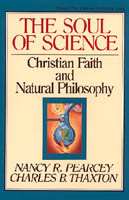
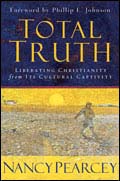 Nancy Pearcey is one of our ARN Featured Authors and one of today’s leading worldview thinkers. Nancy Randolph Pearcey is the Francis A. Schaeffer scholar at the World Journalism Institute, where she teaches a worldview curriculum. After earning an M.A. from Covenant Theological Seminary, she pursued further graduate work in philosophy at the Institute for Christian Studies in Toronto. Currently she serves as a Visiting Scholar at the Torrey Honors Institute at Biola University, and a Senior Fellow at the Discovery Institute. Pearcey has authored and contributed to several works, including the ECPA Gold Medallion winner How Now Shall We Live?, The Soul of Science, and Total Truth.A recent Washington Times interview with Pearcey provides additional insight into the author and her latest book.To order the new book by Nancy Pearcey Total Truth, go to http://www.arn.org/arnproducts/php/book_show_item.php?id=84To order your copy of The Soul of Science: Christian Faith and Natural Philosophy go to: http://www.arn.org/arnproducts/php/book_show_item.php?id=83
Nancy Pearcey is one of our ARN Featured Authors and one of today’s leading worldview thinkers. Nancy Randolph Pearcey is the Francis A. Schaeffer scholar at the World Journalism Institute, where she teaches a worldview curriculum. After earning an M.A. from Covenant Theological Seminary, she pursued further graduate work in philosophy at the Institute for Christian Studies in Toronto. Currently she serves as a Visiting Scholar at the Torrey Honors Institute at Biola University, and a Senior Fellow at the Discovery Institute. Pearcey has authored and contributed to several works, including the ECPA Gold Medallion winner How Now Shall We Live?, The Soul of Science, and Total Truth.A recent Washington Times interview with Pearcey provides additional insight into the author and her latest book.To order the new book by Nancy Pearcey Total Truth, go to http://www.arn.org/arnproducts/php/book_show_item.php?id=84To order your copy of The Soul of Science: Christian Faith and Natural Philosophy go to: http://www.arn.org/arnproducts/php/book_show_item.php?id=83
To order How Now Shall We Live go to: http://www.arn.org/arnproducts/php/book_show_item.php?id=82
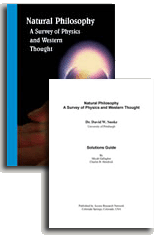 We recently released the 3rd printing of David Snoke’s physics textbook, as well as a solution guide that provides detailed answers to the problems presented in the text.This book is intended for a single year-long course of high school physics or an introductory course of college physics. It presents an overview of the entire subject of physics. This book is not just another version of the standard introductory physics text; it is an entirely new approach to physics. Some educators will find it surprising that the book leaves out, or treats in very brief fashion, several topics that are covered extensively in typical physics books, such as inclined planes, springs, etc. The reason is there are two kinds of physics courses. One type of course answers the question, "What introductory material should an engineer or science major in college study?" A second type of course answers the question, "What should every educated person know about physics, assuming that he or she never studies physics again?" This course is designed to answer the second question. As such, it spends a large fraction of the time on modern physics, the types of questions that modern physicists actually think about. To order your copy of the text or the solution guide or both go to: http://www.arn.org/arnproducts/coverimages/b072sk.htm
We recently released the 3rd printing of David Snoke’s physics textbook, as well as a solution guide that provides detailed answers to the problems presented in the text.This book is intended for a single year-long course of high school physics or an introductory course of college physics. It presents an overview of the entire subject of physics. This book is not just another version of the standard introductory physics text; it is an entirely new approach to physics. Some educators will find it surprising that the book leaves out, or treats in very brief fashion, several topics that are covered extensively in typical physics books, such as inclined planes, springs, etc. The reason is there are two kinds of physics courses. One type of course answers the question, "What introductory material should an engineer or science major in college study?" A second type of course answers the question, "What should every educated person know about physics, assuming that he or she never studies physics again?" This course is designed to answer the second question. As such, it spends a large fraction of the time on modern physics, the types of questions that modern physicists actually think about. To order your copy of the text or the solution guide or both go to: http://www.arn.org/arnproducts/coverimages/b072sk.htm
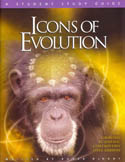 The Icons of Evolution Documentary (ARN #V025) has quickly become an ARN best seller. Now available as a companion to the video, the Icons of Evolution Student Study Guide further illuminates the concepts originated by Dr. Jonathan Wells in his popular book, Icons of Evolution (ARN #B038). Arranged in seven sections that mirror the seven icons dissected in the video, the Icons Study Guide presents a short discussion of each icon, as well as learning goals and study questions within each sub-section. Research notes are also included at the end of the guide. The Icons Study Guide is available as a stand-alone item, for those who already own the Documentary, or as part of the Icons of Evolution Student Study Kit (ARN #V025SKS) and the larger Icons of Evolution Study Kit with Text (ARN #V025SK)
The Icons of Evolution Documentary (ARN #V025) has quickly become an ARN best seller. Now available as a companion to the video, the Icons of Evolution Student Study Guide further illuminates the concepts originated by Dr. Jonathan Wells in his popular book, Icons of Evolution (ARN #B038). Arranged in seven sections that mirror the seven icons dissected in the video, the Icons Study Guide presents a short discussion of each icon, as well as learning goals and study questions within each sub-section. Research notes are also included at the end of the guide. The Icons Study Guide is available as a stand-alone item, for those who already own the Documentary, or as part of the Icons of Evolution Student Study Kit (ARN #V025SKS) and the larger Icons of Evolution Study Kit with Text (ARN #V025SK)
To order the new Icons of Evolution Student Study Guide by itself go to: http://www.arn.org/arnproducts/php/book_show_item.php?id=76
Save 10% when you buy the DVD, and Study Guide
 Jonathan Wells has news for you. Most of the traditional evidence presented for evolution in high school textbooks is wrong. Every iconic image--from the "Haeckel’s Embros" to Darwin’s Finches to the ascent of man--is, says Dr. Wells, either inconclusive, incomplete, or even outright fraudulent. Wells documents his claims in his classic book Icons of Evolution, and the documentary video by the same title has been one of our best sellers.The video is now available in a new Curriculum Modules DVD edition that allows students or teachers to focus on individual Icons for a class session. The Curriculum Modules DVD is structured for use with the new Student Study Guide, which can also be ordered with the Modules DVD as a study kit (v054sk).
Jonathan Wells has news for you. Most of the traditional evidence presented for evolution in high school textbooks is wrong. Every iconic image--from the "Haeckel’s Embros" to Darwin’s Finches to the ascent of man--is, says Dr. Wells, either inconclusive, incomplete, or even outright fraudulent. Wells documents his claims in his classic book Icons of Evolution, and the documentary video by the same title has been one of our best sellers.The video is now available in a new Curriculum Modules DVD edition that allows students or teachers to focus on individual Icons for a class session. The Curriculum Modules DVD is structured for use with the new Student Study Guide, which can also be ordered with the Modules DVD as a study kit (v054sk).
To order your copy of The Icons of Evolution Curriculum Modules DVD (with optional study guide) go to http://www.arn.org/arnproducts/php/video_show_item.php?id=43
Save 10% when you buy the book and DVD
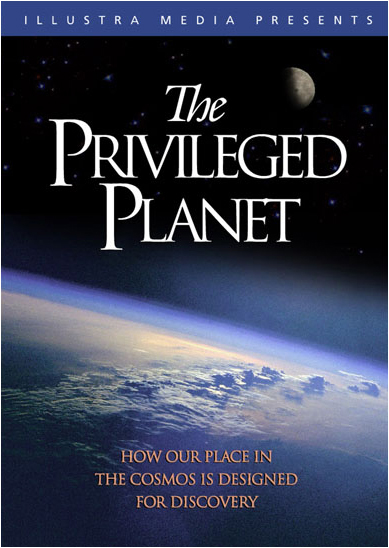 The Privileged Planet is a new ID video documentary that is a “must buy” for Lord of the Rings fans--if for no other reason than to listen to the 60 minutes of narration by John Rhys-Davis (the courageous and lovable dwarf known as Gimli). The deep distinctive Gimli accent, combined with the big symphony music, amazing space photography, ground-breaking computer animations of the universe, and recent scientific revelations make this an inspirational, as well as an educational, experience.Today, most scientists and philosophers claim that Earth is an ordinary speck of dust adrift, without purpose or significance, in a vast cosmic sea. This idea (popularized by the late astronomer Carl Sagan) is an outgrowth of the naturalistic philosophy that has dominated science for the past 150 years. Yet, remarkable evidence–unveiled by contemporary astronomy and physics–may now tell a very different story.Through stunning computer animation, interviews with leading scientists, and spectacular images of Earth and the cosmos, The Privileged Planet explores a startling connection between our capacity to survive and our ability to observe and understand the universe. A connection that points directly to the work of a creative mind and plan.The DVD edition includes several bonus features that make this product a valuable teaching tool 1) an animated journey from the Earth to the outer limits of the universe, 2) a special feature on the search for potentially habitable worlds, 3) Q&A session with several of the scientists featured in the video, 4) spectacular views of our planet as documented by astronauts and satellites, and 5) a reference list of books by scientists and scholars featured in the documentary. The animated journey to the edge of the universe alone is worth the price of this video, as a valuable teaching tool to help students visualize the immense size, and amazing structure of the universe.To order your copy of The Privileged Planet documentary video, go to http://www.arn.org/arnproducts/php/video_show_item.php?id=29
The Privileged Planet is a new ID video documentary that is a “must buy” for Lord of the Rings fans--if for no other reason than to listen to the 60 minutes of narration by John Rhys-Davis (the courageous and lovable dwarf known as Gimli). The deep distinctive Gimli accent, combined with the big symphony music, amazing space photography, ground-breaking computer animations of the universe, and recent scientific revelations make this an inspirational, as well as an educational, experience.Today, most scientists and philosophers claim that Earth is an ordinary speck of dust adrift, without purpose or significance, in a vast cosmic sea. This idea (popularized by the late astronomer Carl Sagan) is an outgrowth of the naturalistic philosophy that has dominated science for the past 150 years. Yet, remarkable evidence–unveiled by contemporary astronomy and physics–may now tell a very different story.Through stunning computer animation, interviews with leading scientists, and spectacular images of Earth and the cosmos, The Privileged Planet explores a startling connection between our capacity to survive and our ability to observe and understand the universe. A connection that points directly to the work of a creative mind and plan.The DVD edition includes several bonus features that make this product a valuable teaching tool 1) an animated journey from the Earth to the outer limits of the universe, 2) a special feature on the search for potentially habitable worlds, 3) Q&A session with several of the scientists featured in the video, 4) spectacular views of our planet as documented by astronauts and satellites, and 5) a reference list of books by scientists and scholars featured in the documentary. The animated journey to the edge of the universe alone is worth the price of this video, as a valuable teaching tool to help students visualize the immense size, and amazing structure of the universe.To order your copy of The Privileged Planet documentary video, go to http://www.arn.org/arnproducts/php/video_show_item.php?id=29
To save 10% and receive both The Privileged Planet book and documentary video go to http://www.arn.org/arnproducts/coverimages/v039sk.htm
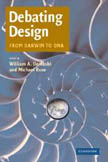 With William Dembski and Michael Ruse as editors one can only imagine that this book will live up to its title. They bring together an all-star cast to argue the pros and cons of four positions: Darwinism, Self-Organization, Theistic Evolution, and Intelligent Design. With Cambridge University Press as the publisher and the balanced presentation, this book should soon find its way into university classrooms.Contributors
With William Dembski and Michael Ruse as editors one can only imagine that this book will live up to its title. They bring together an all-star cast to argue the pros and cons of four positions: Darwinism, Self-Organization, Theistic Evolution, and Intelligent Design. With Cambridge University Press as the publisher and the balanced presentation, this book should soon find its way into university classrooms.Contributors
William Dembski, Michael Ruse, Angus Menuge, Francisco Ayala, Kenneth Miller, Elliott Sober, Robert Pennock, Stuart Kauffman, David Depew, Bruce Weber, Paul Davies, James Barham, John Haught, John Polkinghorne, Keith Ward, Michael Roberts, Richard Swinburne, Walter Bradley, Michael Behe, Stephen Meyer
To order the new book Debating Design go to: http://www.arn.org/arnproducts/php/book_show_item.php?id=101
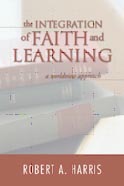 One hundred years ago getting a liberal education was a good thing. It meant developing the ability to understand and argue every position on an issue and then choosing the best one based on a logical, rational decision instead of prejudice, ignorance, or blind assumptions. However, with the secular academic community adopting naturalism (in the sciences) and postmodernism (in the liberal arts), the university often has its own built-in prejudice, and a liberal education today is frequently equated with efforts to disavow students of any theistic worldview they may bring along with their quest for knowledge.This is an issue that has concerned Richard Harris as he has taught at the university level for the past 25 years and he has written an excellent book that should assist students of faith in approaching the university world with their eyes wide open. The book is entitled The Integration of Faith and Learning: A Worldview Approach. Harris compares and contrasts the worldviews of philosophic naturalism, postmodernism, and Christian theism. Throughout the book, emphasis is placed on helping students develop the practical skills needed to evaluate knowledge claims and to integrate all knowledge into a unified whole. A critical thinking approach is encouraged where faith and fact inform each other in a positive way, rather than the confrontational approach frequently found in the university.
One hundred years ago getting a liberal education was a good thing. It meant developing the ability to understand and argue every position on an issue and then choosing the best one based on a logical, rational decision instead of prejudice, ignorance, or blind assumptions. However, with the secular academic community adopting naturalism (in the sciences) and postmodernism (in the liberal arts), the university often has its own built-in prejudice, and a liberal education today is frequently equated with efforts to disavow students of any theistic worldview they may bring along with their quest for knowledge.This is an issue that has concerned Richard Harris as he has taught at the university level for the past 25 years and he has written an excellent book that should assist students of faith in approaching the university world with their eyes wide open. The book is entitled The Integration of Faith and Learning: A Worldview Approach. Harris compares and contrasts the worldviews of philosophic naturalism, postmodernism, and Christian theism. Throughout the book, emphasis is placed on helping students develop the practical skills needed to evaluate knowledge claims and to integrate all knowledge into a unified whole. A critical thinking approach is encouraged where faith and fact inform each other in a positive way, rather than the confrontational approach frequently found in the university.
To view the table of contents or order The Integration of Faith and Learning go to: http://www.arn.org/arnproducts/php/book_show_item.php?id=77
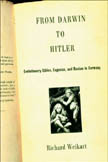 In this compelling and painstakingly researched work of intellectual history, Richard Weikart explains the revolutionary impact Darwinism had on ethics and morality. He demonstrates that many leading Darwinian biologists and social thinkers in Germany believed that Darwinism overturned traditional Judeo-Christian and Enlightenment ethics, especially those pertaining to the sacredness of human life. Many of these thinkers supported moral relativism, yet simultaneously exalted evolutionary "fitness" (especially in terms of intelligence and health) as the highest arbiter of morality. Weikart concludes that Darwinism played a key role not only in the rise of eugenics, but also in euthanasia, infanticide, abortion, and racial extermination, all ultimately embraced by the Nazis. He convincingly makes the disturbing argument that Hitler built his view of ethics on Darwinian principles rather than nihilistic ones. From Darwin to Hitler is a provocative yet balanced work that should encourage a rethinking of the historical impact that Darwinism had on the course of events in the twentieth century.
In this compelling and painstakingly researched work of intellectual history, Richard Weikart explains the revolutionary impact Darwinism had on ethics and morality. He demonstrates that many leading Darwinian biologists and social thinkers in Germany believed that Darwinism overturned traditional Judeo-Christian and Enlightenment ethics, especially those pertaining to the sacredness of human life. Many of these thinkers supported moral relativism, yet simultaneously exalted evolutionary "fitness" (especially in terms of intelligence and health) as the highest arbiter of morality. Weikart concludes that Darwinism played a key role not only in the rise of eugenics, but also in euthanasia, infanticide, abortion, and racial extermination, all ultimately embraced by the Nazis. He convincingly makes the disturbing argument that Hitler built his view of ethics on Darwinian principles rather than nihilistic ones. From Darwin to Hitler is a provocative yet balanced work that should encourage a rethinking of the historical impact that Darwinism had on the course of events in the twentieth century.
To view the table of contents and endorsements or order From Darwin to Hitler go to: http://www.arn.org/arnproducts/php/book_show_item.php?id=75
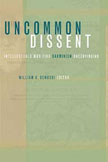 Recent years have seen the rise to prominence of ever more sophisticated philosophical and scientific critiques of the ideas marketed under the name of Darwinism. In Uncommon Dissent, mathematician and philosopher William A. Dembski brings together essays by leading intellectuals who find one or more aspects of Darwinism unpersuasive. As Dembski explains, Darwinism has gathered around itself an aura of invincibility that is inhospitable to rational discussion to say the least: "Darwinism, its proponents assure us, has been overwhelmingly vindicated. Any resistance to it is futile and indicates bad faith or worse." Indeed, those who question the Darwinian synthesis are supposed, in the famous formulation of Richard Dawkins, to be ignorant, stupid, insane, or wicked.The hostility of dogmatic Darwinians like Dawkins has not, however, prevented the advent of a growing cadre of scholarly critics of metaphysical Darwinism. The measured, thought-provoking essays in Uncommon Dissent make it increasingly obvious that these critics are not the brainwashed fundamentalist buffoons that Darwinism's defenders suggest they are, but rather serious, skeptical, open-minded inquirers whose challenges pose serious questions about the viability of Darwinist ideology. The intellectual power of their contributions to Uncommon Dissent is bracing.
Recent years have seen the rise to prominence of ever more sophisticated philosophical and scientific critiques of the ideas marketed under the name of Darwinism. In Uncommon Dissent, mathematician and philosopher William A. Dembski brings together essays by leading intellectuals who find one or more aspects of Darwinism unpersuasive. As Dembski explains, Darwinism has gathered around itself an aura of invincibility that is inhospitable to rational discussion to say the least: "Darwinism, its proponents assure us, has been overwhelmingly vindicated. Any resistance to it is futile and indicates bad faith or worse." Indeed, those who question the Darwinian synthesis are supposed, in the famous formulation of Richard Dawkins, to be ignorant, stupid, insane, or wicked.The hostility of dogmatic Darwinians like Dawkins has not, however, prevented the advent of a growing cadre of scholarly critics of metaphysical Darwinism. The measured, thought-provoking essays in Uncommon Dissent make it increasingly obvious that these critics are not the brainwashed fundamentalist buffoons that Darwinism's defenders suggest they are, but rather serious, skeptical, open-minded inquirers whose challenges pose serious questions about the viability of Darwinist ideology. The intellectual power of their contributions to Uncommon Dissent is bracing.
To view the table of contents or order Uncommon Dissent go to: http://www.arn.org/arnproducts/php/book_show_item.php?id=78
 Returning to a theme first raised five years ago, the July/August 2004 issue of Touchstone presents the Intelligent Design movement and its critique of Darwinism and the naturalistic approach to science and society.Intelligent Design (or ID) theory argues that science itself reveals that the cosmos and plant and animal life were designed and did not arise and develop accidentally, as evolutionary theory claims. These ID theorists — most of whom are Christians, but some of whom are not religious at all — also argue that mainstream evolutionary scientists refuse to see the evidence because they have defined science in a way that unscientifically excludes consideration of the divine. The philosophy of “naturalism” is imposed upon the evidence so that the authority of science is invoked for a secular view of the world. Some in the ID movement have gone on to expose and critique the effect of naturalism in other human enterprises, including ethics, art, and politics.Touchstone’s first issue on ID, published in July/August 1999, became the book Signs of Intelligence (Brazos Books), which is considered one of the best introductions to the ID movement. After five years, the editors wanted to offer readers an update on the development of the ID movement, which has reached a maturity and confidence in its engagement with the Darwinist mainstream.
Returning to a theme first raised five years ago, the July/August 2004 issue of Touchstone presents the Intelligent Design movement and its critique of Darwinism and the naturalistic approach to science and society.Intelligent Design (or ID) theory argues that science itself reveals that the cosmos and plant and animal life were designed and did not arise and develop accidentally, as evolutionary theory claims. These ID theorists — most of whom are Christians, but some of whom are not religious at all — also argue that mainstream evolutionary scientists refuse to see the evidence because they have defined science in a way that unscientifically excludes consideration of the divine. The philosophy of “naturalism” is imposed upon the evidence so that the authority of science is invoked for a secular view of the world. Some in the ID movement have gone on to expose and critique the effect of naturalism in other human enterprises, including ethics, art, and politics.Touchstone’s first issue on ID, published in July/August 1999, became the book Signs of Intelligence (Brazos Books), which is considered one of the best introductions to the ID movement. After five years, the editors wanted to offer readers an update on the development of the ID movement, which has reached a maturity and confidence in its engagement with the Darwinist mainstream.
To order the June/July 2004 special issue of Touchstone magazine on ID, go to http://www.arn.org/arnproducts/coverimages/b092.htm
 In the forward to this book philosopher Michael Ruse states “I disagree with just about everything that he [Menuge] says, and for that reason I urge you to read his book. Partly because I think he is wrong, and I want him refuted. Partly because he makes a good case, and he is worth refuting. A far worse sin than being wrong is being incompetent and boring—and Angus Menuge is neither of these. He makes the case for intelligent agency and against reductionism, and this should be the point for starting future debate.” I can’t think of a better endorsement for the book than from the keyboard of noted ID critic Michael Ruse.To read the glowing endorsements or order the new Agents Under Fire go to: http://www.arn.org/arnproducts/php/book_show_item.php?id=73
In the forward to this book philosopher Michael Ruse states “I disagree with just about everything that he [Menuge] says, and for that reason I urge you to read his book. Partly because I think he is wrong, and I want him refuted. Partly because he makes a good case, and he is worth refuting. A far worse sin than being wrong is being incompetent and boring—and Angus Menuge is neither of these. He makes the case for intelligent agency and against reductionism, and this should be the point for starting future debate.” I can’t think of a better endorsement for the book than from the keyboard of noted ID critic Michael Ruse.To read the glowing endorsements or order the new Agents Under Fire go to: http://www.arn.org/arnproducts/php/book_show_item.php?id=73
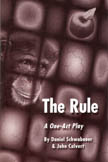 When Nate Plummer presents his 10th-grade biology class with an objective look at human origins, he has no idea it will put him squarely between the Board of Education and the ACLU, accused of teaching creationism to his students. In this one-act play, set during a school board meeting convened to investigate his curriculum, Nate the Biology teacher, finds himself debating his old friend, Dr. Malcolm Trent, Anthropology Professor and School Board Member, to argue the merits and shortcomings of "The Rule", a.k.a the doctrine of Methodological Naturalism. The format and length of The Rule make it ideal not only as a quick read, but also as a great learning tool for middle- or high-school students, to help them understand what the "teach the controversy" debate is all about.
When Nate Plummer presents his 10th-grade biology class with an objective look at human origins, he has no idea it will put him squarely between the Board of Education and the ACLU, accused of teaching creationism to his students. In this one-act play, set during a school board meeting convened to investigate his curriculum, Nate the Biology teacher, finds himself debating his old friend, Dr. Malcolm Trent, Anthropology Professor and School Board Member, to argue the merits and shortcomings of "The Rule", a.k.a the doctrine of Methodological Naturalism. The format and length of The Rule make it ideal not only as a quick read, but also as a great learning tool for middle- or high-school students, to help them understand what the "teach the controversy" debate is all about.
To order your copy of The Rule: A One-Act Play go to: http://www.arn.org/arnproducts/php/book_show_item.php?id=79
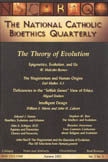 This essay on Intelligent Design was published in The National Catholic Bioethics Quarterly's special issue on the theory of evolution. It appeared along with several other essays on the Theory of Evolution, but is now available by itself in this 31-page text.To order The National Catholic Bioethics Quarterly article Reprint on Intelligent Design go to: http://www.arn.org/arnproducts/php/book_show_item.php?id=80
This essay on Intelligent Design was published in The National Catholic Bioethics Quarterly's special issue on the theory of evolution. It appeared along with several other essays on the Theory of Evolution, but is now available by itself in this 31-page text.To order The National Catholic Bioethics Quarterly article Reprint on Intelligent Design go to: http://www.arn.org/arnproducts/php/book_show_item.php?id=80
Save 10% when you buy the book and DVD
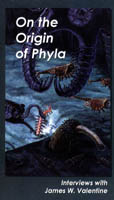
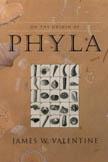 Several years ago we released a video interview with Dr. James Valentine on the origin of the phyla. Now his life’s work has been documented in this 614 page well-illustrated volume recently released by The University of Chicago Press. While Valentine asserts in the preface that his catalog of data supports Darwin’s conclusion that all living things have descended from a common ancestor, most of the evidence he reviews does not fit with classic neo-Darwinian expectations. Reviewers have also pointed out that the Cambrian explosion remains a mystery (see book review by R. Andrew Cameron, Science, July 30, 2004).
Several years ago we released a video interview with Dr. James Valentine on the origin of the phyla. Now his life’s work has been documented in this 614 page well-illustrated volume recently released by The University of Chicago Press. While Valentine asserts in the preface that his catalog of data supports Darwin’s conclusion that all living things have descended from a common ancestor, most of the evidence he reviews does not fit with classic neo-Darwinian expectations. Reviewers have also pointed out that the Cambrian explosion remains a mystery (see book review by R. Andrew Cameron, Science, July 30, 2004).
Truly a magnum opus, On the Origin of Phyla will take its place as one of the classic scientific texts of the twentieth century, and no doubt will provide fresh new data for the Darwin vs. Design debate. Be warned that this volume is intended for the serious student of the fossil data. Beginners and laymen will be better served by our Cambrian Explosion Study Kit (V049SK) based on the Biola video lecture by Steve Meyer and Marcus Ross.
To order the new book by James Valentine On the Origin of Phyla, go to http://www.arn.org/arnproducts/php/book_show_item.php?id=81
To order just the video interview with James Valentine go to http://www.arn.org/arnproducts/php/video_show_item.php?id=7
Or order the book and video interview and save 10% by going to http://www.arn.org/arnproducts/coverimages/v012sk.htm
If you have benefited in some way by the website, emails or products from ARN this year, why not consider making a tax-deductible donation to help us fund our projects and activities for the coming year? You will receive an email receipt for your donation. Access Research Network is a non-profit 501(c)(3) organization based in Colorado Springs, Colorado. We also are able to receive stock or mutual fund donations and we welcome one-time gifts as well as regular monthly supporters. If you run your own business and could benefit from a sponsorship link on our website, I would be happy to discuss this with you.
This web site and the material provided by ARN is made possible primarily through donations from private individuals. We are staffed by a dedicated volunteer-base and a few part-time helpers, so that most of our financial assistance goes directly to fund the acquisition, development, and distribution of our educational resources.
Thank you for being a part of ARN, and I hope you enjoy the holidays with your family and friends.
To make a secure online donation go to:
http://www.arn.org/arnproducts/donation.htm
or send a check to the address below or call our toll-free number to make a credit card donation or inquire about a stock donation.
All of the ARN products can be ordered through our web catalog store with secure credit card ordering. There you will find a description of each product and you may add as many products as you would like to the electronic shopping cart. The suggested donation for each item includes USPS Media Mail for North American orders, which typically arrive in 5-7 days. Overseas prices include Foreign Surface shipping which may take 4-8 weeks. For faster shipping please include an additional donation and request either USPS Priority or Foreign Air. If you provide your email address, you will receive an email receipt of your order. Place your order today online at www.arn.org (click the products links on the top menu bar). If you have any problems or questions, or would rather place your order by phone, call our toll free number at 1-888-259-7102 and our staff will be happy to assist you (or leave your order with our voice mail system if we are out of the office).
Special Note for Christmas Deliveries
Normally our orders are shipped out via USPS Media Mail. All U.S. orders received between now and Christmas will be shipped via USPS Priority Mail. If delivery by Christmas is important, you may want to order by phone and/or upgrade to overnight delivery–call our office for details.
ARN-Announce describes many of the upcoming events and new articles, books, videos and other resources on Intelligent Design. Please forward this message to several of your friends and colleagues to let them know about the resources available at Access Research Network (www.arn.org). Back issues of ARN-Announce can be found at www.arn.org/announce.htm
ARN-Announce is produced by Dennis Wagner (dwagner@arn.org)
Access Research Network is a non-profit organization dedicated to providing accessible information on science, technology and society issues from an Intelligent Design perspective.
Mailing Address:
Access Research Network
PO Box 38069
Colorado Springs, Colorado
80937-8069
Contact:
(719) 633-1772 voice
(719) 520-1241 fax
(888) 259-7102 toll-free order line
On the web:
www.arn.org
TO ADD YOURSELF TO ARN-ANNOUNCE:
Send an email to "ARN-Announce-request@arn.org".
The body of the message should consist of the word "SUBSCRIBE"
and nothing else. Or visit the web page at www.arn.org/announce.htm
and select Subscribe and enter your email address. You will receive
a confirmation email indicating your name has been submitted to the
list. Follow the directions and reply to the email and your email address
will be added to the ARN-ANNOUNCE list.
TO REMOVE YOURSELF FROM ARN-ANNOUNCE:
Send an email to "ARN-Announce-request@arn.org".
The body of the message should consist of the word "UNSUBSCRIBE"
and nothing else. Or visit the web page at www.arn.org/announce.htm
and select Unsubscribe and enter your email address. Your email
address will be automatically removed from this list.
Copyright 2004 Access Research Network. All rights reserved. International copyright secured.
12.10.04